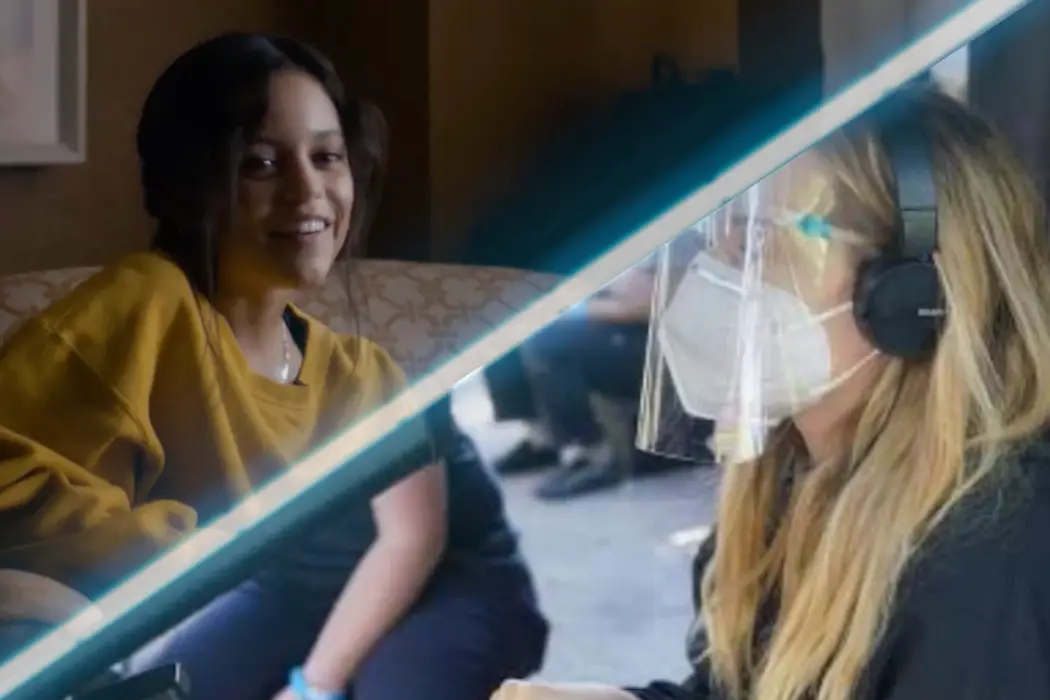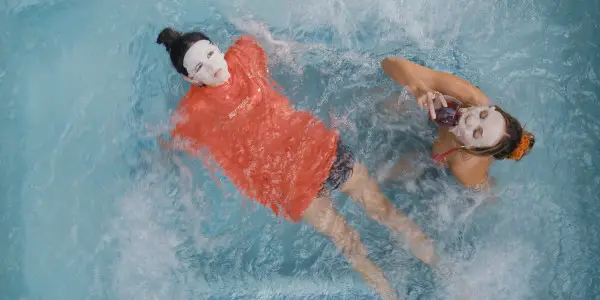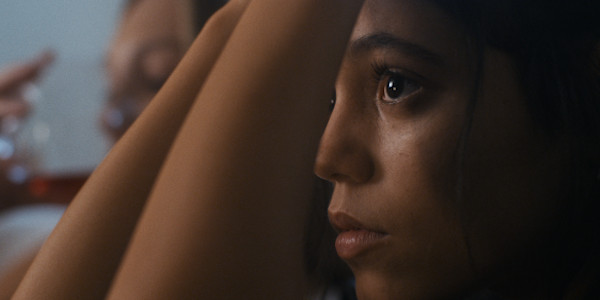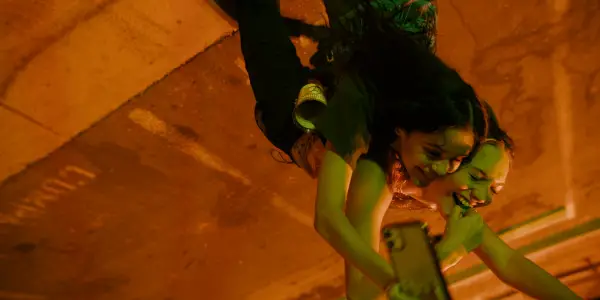Interview With Megan Park, Writer-Director Of SXSW Winner THE FALLOUT

Luke Parker is an award-winning film critic and columnist based…
The saturation of mass shootings in America leaves a lot out of the national conversation, especially anything resembling a long-term consequence. What happens in a heartbroken town once the news trucks pack up and head to the next crime scene? This is what Megan Park‘s debut feature as a writer-director – appropriately titled The Fallout – seeks to explore.
The film follows the reactions of a group of teenagers in the days and weeks following a heinous shooting at their school. Some find their voice. Some find passion. And others, not so much. Vada (Jenna Ortega), for instance, is left paralyzed. Overwhelmed by the event itself, but also the revolutionary reactions of some of her classmates, she soaks in grief. She finds some comfort in her new friendships with Mia (Maddie Ziegler) and Quinton (Niles Fitch), who huddled and hid with her during the shooting, but Vada is wrapped in a funk – to put it lightly – she can’t break.
Film Inquiry spoke with Park only an hour or two after the news broke she had won the Brightcove Illumination Award for filmmakers on the rise, and The Fallout won the Grand Jury prize for narrative films at SXSW 2021. The enthusiastic director touched on the factors that led to her telling this story and the influence her own onscreen career had on her behind-the-scenes style.
This interview has been edited for clarity.
Luke Parker for Film Inquiry: I understand I’m one of the first people you’ve talked to since hearing about all these awards. Congratulations! I was really excited to get that email this morning. How are you feeling?
Megan Park: Thanks! It’s crazy. I feel like I have not processed it yet. It’s so weird that anyone has seen this movie and that anyone likes this movie; that’s still mind-blowing to me. I feel like I’m just wrapping my mind around that. And the fact that we won is just crazy.
Surprised because this is your first movie? Is it that kind of thing?
Megan Park: I think so, yeah. I’ve never done this before. I come from the acting side, where you sort of insert yourself in other people’s art. It’s a different feeling to create something, and write it, and direct it, and put it out. It feels like you’re birthing a child, in a weird way.
It’s very vulnerable. It’s just so weird that it came from my brain and now people are seeing it and feeling something from it. It’s a really wild feeling.

It must be quite a sensation to create something that people relate to.
Megan Park: You can only hope that somebody feels something when they watch it. And it’s been really cool to hear that people have been. It’s very exciting.
***
Jenna Ortega admitted she felt guilty at times researching her part, saying, “it almost felt wrong to dig into…[something she] wasn’t a part of or will never be able to fully comprehend.” Did you have any similar feelings making this film?
Megan Park: Yeah, I did. I remember I had wanted to write this movie for a while, or at least talk about my feelings about shootings. But I was really scared too. I felt the same thing. I hadn’t specifically experienced that, luckily. But because I was Canadian and certain reasons like that, I thought maybe I wasn’t the right person to talk about this.
After a while, I started realizing I couldn’t not tell this story. It was really important to me that this version of healing was talked about. So I just went ahead and did it.
I obviously did a lot of research and spoke to people; did my due diligence, hopefully. But it was scary. It’s a tough subject to talk about.
What made you finally surpass that hesitation?
Megan Park: I think every single time another shooting happened, it made me want to write the film more and more. And sadly, there are a lot. They served as a constant reminder to me about how much I wanted to talk about it.
Writing a screenplay in two weeks is no small feat. That kind of productivity, I think, is usually spurred by either a really strong emotion or, more in my case, a really strict deadline. For you, was anger that emotion?
Megan Park: I’m still discovering myself as a writer because this is all new to me. But what I have discovered so far is that I think about things for a long time in my head. And I think about the characters before I ever stop writing. So, even though I wrote the script really fast, I had been thinking about it for a long time. I had already come up with the character of Vada and the character of Quinton, and I remember the moments when they each came to me, in terms of how they all click and how their stories weave together.
It wasn’t a hard deadline or one specific, overwhelming emotion. There wasn’t necessarily anything that made me sit down and write like a madman. When it finally all clicked – I remember I was home in Canada over the Christmas break, and I had some downtime, away from work and distractions – I was able to just get it done.
The long-term emotional effects of a school shooting are something that largely gets swept under the rug in terms of the national narrative. And with your different characters, you put many different faces on what those effects look like. Like you said, you spent a lot of time with the characters before you started writing the script. How did these character’s perspectives form in your mind?
Megan Park: I was just imagining the different ways these young people today must react to this. There’s not enough time to comprehend it. I think I specifically was like, “oh my god, those kids from Sandy Hook must be teenagers now!” And then recently, very recently, one of them actually spoke out and did this incredible interview way after we finished the movie.
It stays with them. Or I imagine it stays with them.
And I was thinking about what it’s like for the kids who experience real loss, like Quinton does with his brother, or the kids who don’t experience it directly, but are in the school – all these different perspectives that we often forget about because there isn’t enough time before another shooting happens. We only see the faces of the kids who pass away, which is obviously horrific, but the violence stays with everybody. It stays with their families. It stays with their siblings. It trickles down and affects their whole lives forever. So, I just wanted to explore what that might look like.

This may be a stretch but it’s a connection that worked for me, so I thought I’d share it with you. And if it crashes and burns, it crashes and burns.
“Gone,” the beautiful, haunting song that plays while Vada fills her hope chest with the funeral programs of her classmates – when I heard it, I couldn’t unhear “The Battle Hymn of the Republic.” And whether or not that was the intention of the songwriters, it was the first connection I made from this localized story to the national issue it represents. Everyone watching The Fallout already knows the persistence of this trend in America, but writing the film, how did you want to incorporate the bigger story into your story?
Megan Park: That’s interesting. I don’t know if it was. I’ll have to ask them.
But I never wanted to force a message on anyone with this movie. I ultimately wanted this to be healing for people. I think everybody can relate to being a young person dealing with trauma, dealing with grief, wrapping their heads around big emotions and how challenging that can be.
I didn’t want to try and force a message, but I did want the film to be a reminder that shootings are an active problem. This isn’t a problem of the past. This is still a reality for young people in this country, and for all people. It was a fine line to walk. It was something that was tricky to navigate, for sure.
Another connection – I admit this one is way less of a stretch – came from the character Nick and the tremendous and brave work of student survivors. Nick takes a stance in the film that the only way to deal with this tragedy is political, not emotional. And because of that stance, a tension develops between him and Vada. Why was it important for you to put that strain on this friendship? What did you want to show?
Megan Park: I actually want the character of Nick to be a hero in Vada’s eyes, which I think that he is. I don’t think it’s that he’s unable to process it emotionally. I think it’s that he is someone who is able to use his pain and what he’s feeling to become vocal and outspoken. Use it to help change. I think that’s incredible. And I wanted Vada to be almost intimidated by that, and to feel really guilty and overwhelmed that she isn’t able to process it, either in real time or as an activist.
That character is not supposed to be a direct reflection of any specific person, but definitely a culmination of the type of person who’s able to turn their pain into an incredible movement. Again, I think that’s really inspiring, and I wanted Vada to bear the burden of not being able to do what her best friend is doing, even though it’s what she thinks is the most admirable thing to do.
This film features a stellar cast of young performers. And you of course started your own career at a young age. I was wondering if and how those experiences helped guide your direction of these younger actors?
Megan Park: I think it definitely did. Growing up on sets and working with all different types of directors and styles, I definitely in the back of my mind was like, “if I ever do this, I want to be like this and create an atmosphere that’s like this.”
When I met Jenna [Ortega], when I met Maddie [Ziegler], and Lumi [Pollack], who had never done anything before, I could tweak my style to what each of them needed. Certainly, some actors need more feedback, or direction, or space, or more pre-pro work together before you shoot. Everybody needs something different, so I tried to tailor myself to each actor once I got to know their style – which hopefully helped.
And I tried to create an atmosphere that was safe and supportive and free to explore. I wanted to give them the space to do whatever they wanted to do. I definitely think all those years of being in front of the camera helped inform that, and helped me feel comfortable working with all different styles of actors.

Though this was your feature debut, I know you’ve done some work at the helm of music videos and different shorts in the past. Considering your history with music videos specifically, how did rhythm play a part in your direction of The Fallout?
Megan Park: I love working on music videos. I feel like narrative storytelling is my passion and my home, and I’m very visual, so it was a fun mix of the two. I think, rhythmically, that’s an interesting question. The stairwell scene, where she’s on ecstasy, I knew the song already that we were going to be using and could direct to what I wanted that to look like.
But the scene where the two girls are drunk and the camera goes upside down, that was a whole scripted scene that we turned into a music moment in the edit. So, I wasn’t necessarily thinking about that in a super rhythmic way.
Music videos gave me room to experiment and to try things I maybe wouldn’t have tried otherwise. They taught me to shoot super fast [laughs] which was really helpful. I met my DP, Kristen Correll, doing a music video. So, it definitely helped inform some things, but I feel like narrative is actually where I’m most comfortable.
Film Inquiry thanks Megan Park for taking the time to speak with us!
The Fallout premiered at SXSW 2021.
https://youtu.be/E9YohaQ2N4U
Does content like this matter to you?
Become a Member and support film journalism. Unlock access to all of Film Inquiry`s great articles. Join a community of like-minded readers who are passionate about cinema - get access to our private members Network, give back to independent filmmakers, and more.
Luke Parker is an award-winning film critic and columnist based in the Baltimore-Washington metropolitan area. As an entertainment journalist, he has interviewed several members of the film industry and participated in some of its most prestigious events as a member of the press. Currently, he is working to obtain his bachelor’s degree in Mass Communication at Towson University.













